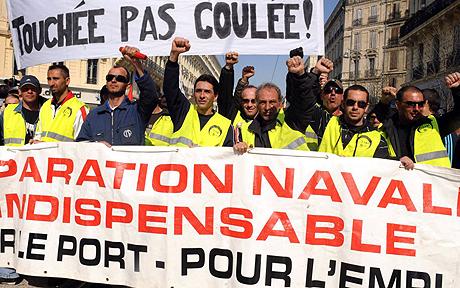
(Source: EE Times Europe. 17 June 2009)
Fear of unemployment is rising in France as recession takes hold. Strikes, riots and social unrest have gone to extremes as workers feel they are running out of options and, even worse, they have nothing to lose.
About 250 workers at Altis Semiconductor SA, a joint venture between Infineon and IBM, have been blocking production since June 15. Trade unions have announced "an unlimited strike" and called for "an acceptable restructuring program".
In parallel, workers at ST-Ericsson in Caen, France, have been on strike since June 10, protesting against the company's decision to wind down operations by the second quarter of 2010.
On their website, the CFTC labor union representatives for Altis Semiconductor list the best examples of severance package obtained through demonstrations of the French labor movement. Presented as victories, these examples deliver a "we can do better" message and raise the bar for even more money.
For instance, after Tyco Electronics announced it would cut 620 jobs, the company agreed to pay a minimum of 30,000 euros (about $42,000) per worker. At Atmel Rousset, after the company unveiled a plan to lay off 180 people, workers protested and obtained a pay-off starting at 34,000 euros (about $47,500) and 1.4 month's pay per seniority year.
Even better, the website indicates that when tire maker Continental AG announced it would close its site in Clairoix, northern France, the company's 1,120 workers refused the 17,000 euros (about $24,000) in compensation. After violent protests, management eventually offered workers a pay-off starting at 50,000 euros (about $70,000), which would reach up to 100,000 euros (about $140,000) for those working for the company for more than 30 years. Employees would receive their normal salary until October and 85 percent of their pay until 2011 and unemployment benefit, or 75 percent of their salary, until 2014.
It seems that organized workforces across France have both the government and multinational companies running scared of the power they can command. Is there a limit? No, as it seems that the more workers protest, the more money they obtain. This is a prosperous period for French labor movements as angry workers listen attentively to their anti-capitalistic messages.
In March, however, some French workers used an unusual tactic to jump-start negotiations regardless of whether it was legal or morally right or wrong. This tactic was nothing less than the kidnapping of their bosses.
In mid-March Sony France workers held the chief executive Serge Foucher captive at the videotape plant in Pontonx-sur-l'Adour, in the South-West of France, because they were angry over their severance packages.
After that about 150 striking workers from a 3M plant in Pithiviers, France, released their manager after holding him hostage for more than 24 hours to demand better separation pay. 3M is a Minnesota-based firm that manufactures diverse products from cellophane tape to optical films for liquid crystal displays.
This pattern of worker direct action has been used outside the high-technology sphere as well. Workers in a Caterpillar factory in Grenoble, France, prevented four executives from leaving their offices as a protest against the company's layoff plans and François-Henri Pinault, chairman and CEO of PPR, home to luxury brands such as Gucci and Yves Saint Laurent, was trapped in a Paris taxi by angry workers from two of his stores that had announced 1,200 job cuts.
For many French workers a return to an all-embracing and supportive state is preferable to the unemployment that looms.
